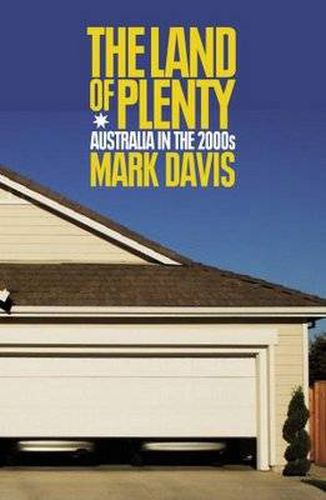Mark Davis

Mark Davis was the talk of the literary town with his bestselling debut
Gangland.
Now, with his much-awaited follow-up book,
The Land of Plenty,
he argues that the Australian dream has been forsaken. If we’re so prosperous, why are we working harder and longer, for so little, while important social agendas have fallen by the wayside? Jo Case spoke to him for Readings on the eve of its publication.
You were inspired to write this book by the example of Donald Horne’s
Horne was writing near the end of a thirty year period of protectionism, whereas I’m writing near the end of a thirty year period of more or less unbridled faith in free markets. The similarity is that in both cases the economy is being propped up by a mining boom! We’re still ‘living on our luck’, as Horne put it. One project of the book is to ask what the past thirty years of faith in markets have amounted to? What social costs have we paid for what benefits and why, after so much economic reform, are we still dependent on digging stuff up?
‘A timidity of thinking has overcome debate,’ you say. How does that manifest itself?
The ‘timidity of thinking’ refers to the automatic deference to markets that characterises so much government thinking and media commentary.
You write about the ‘new importance of money to Australian society’, and describe us as ‘a society where money has been allowed to become the measure of all things’. How do you think this change took place? What does this mean for the way we live now?
Again, it’s about the logic of handing everything over to markets. I’m not against markets per se, and I’m certainly not in favour of a return to the protectionist ‘fortress Australia’ of the past. But I’m wondering what alternatives there might be to the present lassitude, given a widespread concern among people about where we are at socially and economically as individuals and as a society.
You observe that ‘race politicking’ and the politics of economic reform, though popularly seen as having little to do with each other, are in fact inextricably linked. How?
Obviously, during the Howard era race politicking served as a smokescreen for the social inequalities that are a hallmark of free markets, via wedge politics and the creation of scapegoats. But at a deeper level the conservative-libertarian philosophising that underpins monotheistic free-market thinking is actively hostile to the idea of group rights and the championing of minorities, which it regards as forms of primitivism.
‘Egalitarian ideals remain enshrined in Australian culture, but less and less do they reflect the way Australian society is actually organised.’ The growing divide between public and private services (and the neglect of the public) is one major thing that you discuss. What are some of the other changes you’ve noticed?
A few years back my partner and I drove through north-west country Victoria and I was struck by the way in which, when you turned off the highway and poked around the back-streets of prosperous-looking country towns, there were obviously high levels of poverty and under-employment. I’ve since become more and more interested in how, behind the veneer of our recent ‘prosperity’, the reality has been somewhat different for many people. There’s a widening gap between those with the skills and education to tap into the global economy, and those without. Whole groups of people – unskilled, jobless men over 50, for example – have been effectively chucked on the scrap heap as the economic structure of society and hence work, has changed over the past few decades. Yet while such divides are increasingly definitive of ‘the way we live now’, they don’t get much airtime.
You observe that outer-suburban ‘aspirationals’, with their flat-screen TVs and McMansions and late-model cars, are misunderstood by commentators like Clive Hamilton, who criticise them for being more affluent than ever, yet still wanting more. What is your take on this?
My over-arching question would be, what’s wrong with the suburbs and the suburban lifestyle? Why do some commentators apparently take such comfort in bashing people who enjoy things like newish, large houses and big TVs, without examining how, in the present climate of high housing costs and high fuel costs, it makes perfect sense for people move to where they can afford to live, and to orient their leisure time around the home?
While money has become increasingly important, on the other hand you note an increasing preoccupation with the non-material aspects of our lives. What do you think is driving this? Do you think it is encouraging?
People, I think, are increasingly looking beyond markets and beyond money for satisfaction. They want something more, and recognise more and more that the marketisation of society hasn’t been a path to fulfilment. Obviously they’re looking in all sorts of different directions, from new age investigations to craft to eco-tourism to organised religion, but I think all are part of a renewed search for values that’s going on.
Do you think it is possible to ‘turn back the clock’ on major changes like the privatisation of public utilities and public transport, or address the quality gap between public and private hospitals and schools? If not, how else can we look at addressing the problems that have arisen as a result?
For me it’s all about bringing government back in, and planning for needs given the failures of markets in areas like health, education, child care, dental care, and so on. There’s so much that markets haven’t been able to adequately do. But nor should we try to simply turn back the clock. My point is that both the era of protectionism and the era of one-size-fits-all marketisation have been failures in important respects, and that its time to formulate new approaches.
‘The challenge now is to map out a new role for government.’ What kind of new role do you envisage?
If the protectionist era was all about a universalist approach to service provision, and then we went for the ‘hands off’ approach in the free-market era of ‘small government’, then we need something different. Not a weak-kneed ‘third-way’-style approach that simply accepted and tried to ameliorate the worst aspects of the market economy, but a deeper change in the way we think about government. Government is us. It has a central role to play in the economy. Only governments, not markets, can plan ahead and create equity. Yet economic openness will remain a central principle. I think we’re moving into a quite different kind of future, where government is accountable, active, strategic, cleverly interventionist in ways not seen before; a potentially exciting future. But it’s up to us to make it happen.



